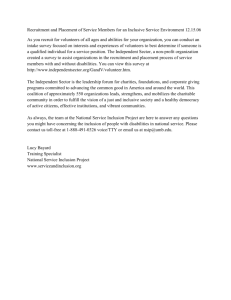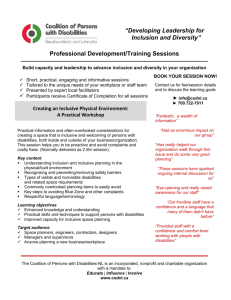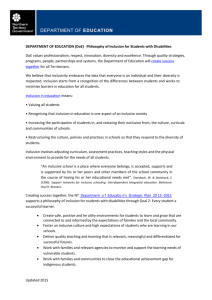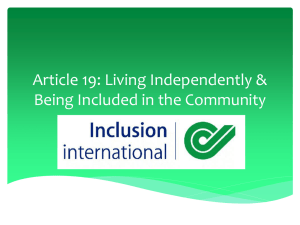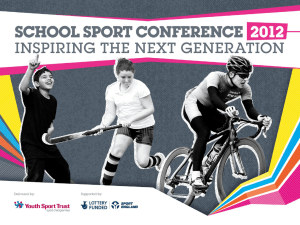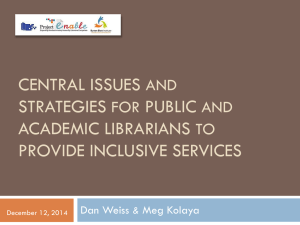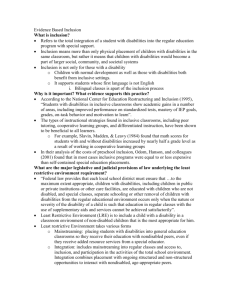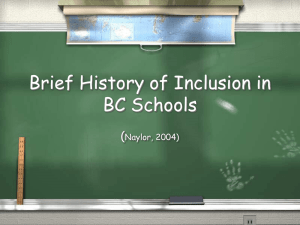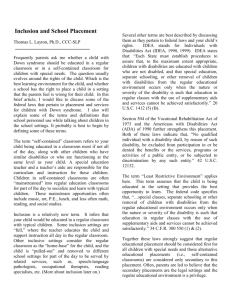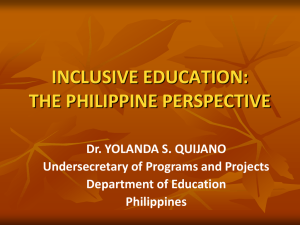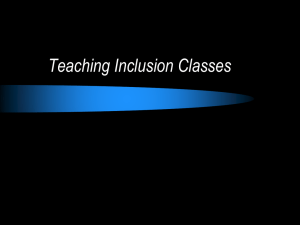scott_w._harrington_session_12
advertisement
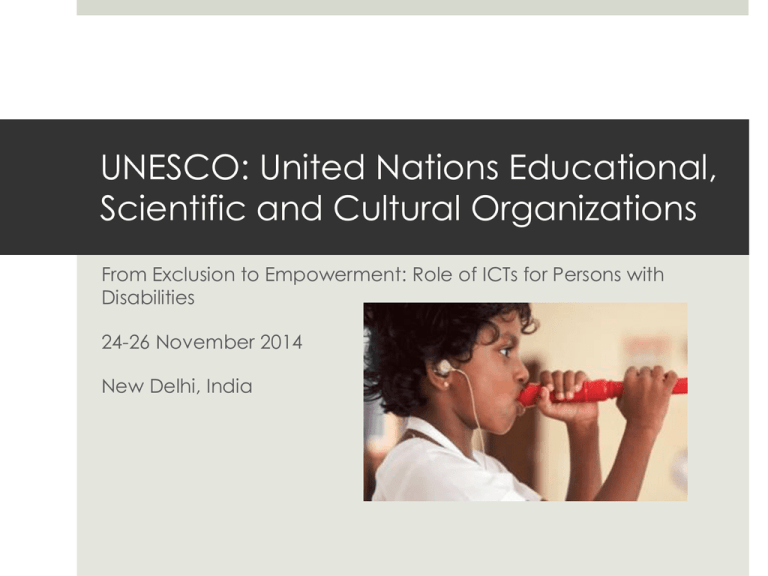
UNESCO: United Nations Educational, Scientific and Cultural Organizations From Exclusion to Empowerment: Role of ICTs for Persons with Disabilities 24-26 November 2014 New Delhi, India Utilizing the i2Lab to Facilitate Integrated Employment and Community Inclusion Scott W. Harrington, Ph.D., BCBA-D University of Nevada, Reno Thank you Other members on this panel Lindsay Young and Lindsay Cotton Mr. Indrajit Banerjee & conference organizers The Nevada Center for Excellence in Disabilities at the University of Nevada, Reno Representatives from the Government of India Special thanks to Irmgarda Kasinskaite Overview & Goals Ten minutes to plant seeds of innovation Philosophical foundation: Full community inclusion Conference Mission & Goals Inclusive Employment Examples from Nevada ICTs as the conduit for sustainable change, with a focus on integrated employment The i2Lab at work in the Community The facts 650 million persons with disabilities in the world (15%) 80% live in isolated or rural areas 186 million children with disabilities have not completed primary school education “Disability” cuts across all gender, ethnic, racial, socioeconomic, and religious barriers. We are simply just “temporarily abled” Our challenge “The challenge now is to take the situations of persons with disabilities fully into account and to incorporate their needs as well as to make responses available to everyone.” (UNESCO) We can and will: Presume competence, while being mindful of personcentered supports Move toward a fully inclusive community Introduce new policy and new initiatives Share innovative practices Use ICTs as the conduit for inclusion Inclusion in Employment-Nevada Success Stories 1. One person at a time, making a fit where the person’s passion, skills, and interests benefit the business. 2. “Customized Employment” 3. Must work in an integrated setting 4. Must earn a wage similar to that of a coworker 5. Build natural supports 6. Volunteering is acceptable when working toward an employment outcome. Full Inclusion at Work-Stacy Stacy included at Starbucks 1. Carved a position where she cleans the coffee shop. 2. Been employed four years, earned three raises ($10.25/hr) 3. Works three days a week, four hours per day 4. Has natural supports 5. Takes public transportation from her apartment Full Inclusion at Work-Eric Eric scanning documents 1. Community-based assessment at state agency 2. Earns $8.25/hour at small business 3. Scans documents and drags PDF into folder 4. Works two days a week, four hours per day 5. Starting his own business with supports Full Inclusion Volunteering-Ian Ian gaining valuable experience 1. Volunteers for the Washoe County cleaning the park 2. Enjoys solitary work 3. Listens to his music 4. Letter of Recommendation from the Park Ranger 5. Time-limited to avoid business taking advantage of a hard worker Full Inclusion at Arrow-Glenn Arrow Electronics-Glenn 1. Moved from segregated job to inclusive job at Arrow 2. From $40/week to $400/week 3. Repetitive work requiring much attention to detail 4. Found a girlfriend at work 5. Bought a new TV and videogames 6. Takes bicycle and public bus to work The i2Lab at work Which articles of the UNCRPD can be affected with Integrated Employment? The i2Lab at work Which articles of the UNCRPD can be affected with Integrated Employment? Answer: All of them! The i2Lab at work-Community How can we use the i2Lab to help individuals be included in their communities? The i2Lab at work-Community How can we use the i2Lab to help individuals be included in their communities? The Four Interlinked Zones 1. Development 2. Digital Accessibility 3. Dialog and Creative Expression 4. Diversity The i2Lab at work-Community The Development Zone: The development of core academic subjects and…. “… online resources and services, as well as access to practical technology that supports a multidisciplinary approach to formal education, access to information and knowledge, and civic engagement.” The i2Lab at work-Community The Development Zone The zone can provide a conduit to: 1. Employment opportunities 2. Volunteer opportunities 3. Resume writing 4. Job search supports 5. Discovery supports 6. Interview tips 7. Job developers/providers 8. Video resumes 9. A pool of potential candidates for employers 10. Information for employers on accessibility, UDL, UNCRPD, etc. 11. ????? The i2Lab at work-Community The Development Zone The zone may include access to: 1. The private sector 2. NGOs 3. Government 4. Civic engagement 5. Self-advocacy 6. Inclusive social and recreational opportunities 7. More!!! The i2Lab at work-Community Key underpinning requirements Three core principle: 1. Inclusive and accessible learning content 2. Inclusive technologies for experimentation and exploration 3. Access to peer and expert support A Conference Declaration with teeth Measureable outcomes from stakeholders on: 1. Implementing ICTs 2. Draft policies, products, and innovative services 3. Clear communication about barriers and successes 4. Commitment reflected in “concrete actions” toward full inclusion Thank you Scott W. Harrington, Ph.D., BCBA-D Director Youth Transition Nevada Center for Excellence in Disabilities (NCED) University of Nevada, Reno Reno, NV 89557 sharring@me.com (775) 682-9059
